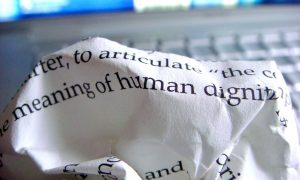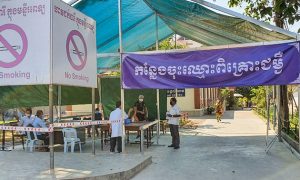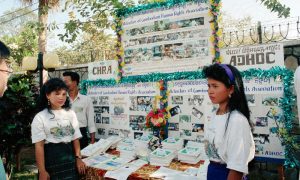Click here to go to read in Khmer
There are two most contested commemorations in Cambodia’s modern history: Vietnam’s removal of the Khmer Rouge from power in 1979, and the peace agreements in 1991. Both historic events marked a watershed in Cambodian and Southeast Asian modern politics. While Vietnam’s military campaign put an end to the Khmer Rouge regime and massacres on 7 January 1979, this action also led to a civil war which caused humanitarian crises in the country and destabilised the region until the early 1990s, when the Comprehensive Cambodian Peace Agreements (known as the Paris Peace Agreements, hereafter the PPA) was signed in Paris on 23 October 1991. The agreements led to the establishment of the United Nations Transitional Authority in Cambodia (UNTAC), which operated a peace-keeping mission and organised democratic elections that were held in 1993. After the elections, a new coalition government was formed, and the commemoration of the PPA immediately became a site of contention between First Prime Minister Prince Nodorom Ranariddh (President of the royalist FUNCINPEC Party) and Second Prime Minister Hun Sen (Vice-president of the Cambodian People Party, hereafter the CPP).
It was contested because when the PPA anniversary of 23 October was newly instated as a national celebration, the CPP’s most important commemoration of 7 January 1979, which had been celebrated annually as “Liberation Day” since 1980, was suspended. The suspension happened due objections from the FUNCINPEC and the Buddhist Liberation Democratic Party (BLDP), which viewed the 7 January event as a symbol of Vietnam’s invasion of Cambodia. But in 1996, only a few days prior to its 17th anniversary, Hun Sen successfully demanded his co-premier Ranariddh reinstate the 7 January Liberation Day as a national celebration, along with the PPA commemoration. Ever since, Liberation Day has remained an important national celebration and a public holiday, while the PPA anniversary has officially been suspended twice, from 2004 to 2012, and again in 2019 until the present. No explanation for the 2012 reinstatement was given by the government but it cited economic reasons for the suspensions in 2004 and 2019.
This year marked the 30th anniversary of the PPA. Even though it was no longer a national celebration, the Cambodian government commemorated the event by issuing a new banknote featuring a portrait of the late King Sihanouk holding hands with Hun Sen. An official ceremony hosted by Minister of Foreign Affairs and International Cooperation Prak Sokhonn was held at the Peace Palace in Phnom Penh. In Paris, there was a public gathering to commemorate the anniversary led by opposition leader Sam Rainsy, along with other assemblies and protests organised by opposition supporters around the world. There were also many public seminars and academic forums to celebrate the PPA organised by civil societies, think tanks, journalists’ clubs, embassies, and higher education institutions in Cambodia and outside.
Even though these stakeholders commemorate the same historic event, they actually have different interpretations of its meaning and legacy. The government has largely considered the PPA as a “ghost” which has little impact on Cambodia’s peace and development and is no longer applicable to current situations, whereas the opposition party and civil societies have demanded the government be held accountable to the agreements with regards to the respect for multi-party democracy and human rights.
Whatever the disagreements are, the PPA should be remembered based on two principles. First, the agreements did put an end to the civil war that was militarily contested by four different Cambodian factions for the entire 1980s. Even though the Khmer Rouge boycotted the 1993 elections and continued to destabilise the country’s peace and development until the late 1990s, the PPA led to the formation of an internationally recognised government and the repatriation of hundreds of thousands of Cambodian refugees along the Thai-Cambodian border.
Second, apart from Sihanouk and Hun Sen, BLDP leader Son Sann and Khmer Rouge faction leader Khieu Samphan were also signatories to the Peace Agreements. Regardless of what happened after the agreements, the two leaders’ role and perspectives, along with larger Cold War geopolitics of the late 1980s and early 1990s, should also be remembered in discourses around the commemoration of the PPA.
សន្ធិសញ្ញាសន្តិភាពក្រុងប៉ារីឆ្នាំ១៩៩១របស់កម្ពុជា: ៣០ឆ្នាំនៃការចងចាំដ៏ចម្រោងចម្រាស់
ដោយ ធុន ធារ៉ា
នៅក្នុងប្រវត្តិសាស្ត្រកម្ពុជាសម័យទំនេីប មានព្រឹត្តិការណ៍ចម្រោងចម្រាស់សំខាន់ពីរ ដែល ទីមួយ ទាក់ទងនឹងវៀតណាមផ្តួលរំលំរបបដឹកនាំខ្មែរក្រហមនៅឆ្នាំ១៩៧៩ និង ទីពីរ កិច្ចព្រមព្រៀងសន្តិភាពក្រុងប៉ារីសឆ្នាំ១៩៩១។ ព្រឹត្តិការណ៍ទាំងពីរ ជាចំណុចរបត់ដ៏សំខាន់ សម្រាប់ប្រវត្តិនយោបាយទំនេីបរបស់កម្ពុជា ក៏ដូចជាតំបន់អាសុីអាគ្នេយ៍ទាំងមូល។ ខ:ណ:ពេលដែលយុទ្ធនាការយោធារបស់វៀតណាម បានឈានទៅដល់ការដួលរលំនៃរបបខ្មែរក្រហម និងការសំលាប់រង្គាល នាថ្ងៃ៧ មករា ឆ្នាំ១៩៧៩ កម្មភាពរបស់វៀតណាមក៏បាននាំមកផងដែរនូវសង្គ្រាមសុីវិល ដែលបង្កអោយមាននូវវិបត្តិមនុស្សធម៌នៅកម្ពុជា និងអស្ថិរភាពតំបន់ទាំងមូលរហូតដល់ដេីមទសវត្សរ៍១៩៩០។ នាដេីមទសវត្សរ៍១៩៩០នេះ កិច្ចព្រមព្រៀងសន្តិភាពមួយត្រូវបានបង្កេីតឡេីង ដែលមានឈ្មោះថា “កិច្ចព្រមព្រៀងស្តីពីដំណោះស្រាយនយោបាយរួមមួយនៃជំលោះកម្ពុជា” (ដែលគេស្គាល់ជាទូទៅថា កិច្ចព្រមព្រៀងសន្តិភាពក្រុងប៉ារី) ដែលបានចុះហត្ថលេខាដោយភាគីជំលោះទាំងអស់ នាថ្ងៃទី២៣ តុលា ឆ្នាំ១៩៩១។ សន្ធិសញ្ញានេះ បានឈានទៅដល់ការបង្កេីតរដ្ឋាភិបាលអន្តរកាលមួយក្រោមការសម្របសម្រួលរបស់អង្គការសហប្រជាជាតិ ហៅកាត់ថា “អ៊ុនតាក់” ដែលមានតួនាទីចំបងក្នុងការរក្សានូវស្ថេរភាព និងរៀបចំការបោះឆ្នោតបែបប្រជាធិបតេយ្យ ហេីយបានធ្វេីឡេីងនៅឆ្នាំ១៩៩៣។ ក្រោយការបោះឆ្នោតបានបញ្ចប់ រដ្ឋាភិបាលសម្ព័ន្ធភាពថ្មីមួយត្រូវបានបង្កេីតឡេីង ហេីយការចងចាំនៃសន្ធិសញ្ញាក្រុងបារីស បានក្លាយទៅជាចំណុចប្រឈមគ្នារវាង នាយករដ្ឋមន្ត្រីទីមួយ ទ្រង់នរោត្តម រណឫទ្ធិ (ប្រធានគណបក្សហ៊្វុនសុិនបុិច) និង លោកហ៊ុន សែន (អនុប្រធានគណបក្សប្រជាជនកម្ពុជា) ដែលជានាយករដ្ឋមន្ត្រីទីពីរ។
ការប្រឈមនេះ កេីតឡេីងដោយសារ ខ:ណ:ដែលសន្ធិសញ្ញាសន្តិភាពក្រុងប៉ារី ថ្ងៃ២៣ តុលា ត្រូវបានដាក់បញ្ចូលជាពិធីបុណ្យជាតិ ការចងចាំនៃថ្ងៃរំដោះ ៧ មករា ដែលគណបក្សប្រជាជនកម្ពុជា ចាត់ទុកជាថ្ងៃសំខាន់បំផុតរបស់ខ្លួន ហេីយបានប្រារពឡេីងរាល់ឆ្នាំចាប់តាំងពីឆ្នាំ១៩៨០ ត្រូវបានដកចេញពីពិធីបុណ្យ ឫការចងចាំថ្នាក់ជាតិ។ ការដកចេញនេះ គឺដោយសារ មានការជំទាស់ពីគណបក្សហ៊្វុនសុិនបុិច និងគណបក្សក្នុងរដ្ឋាភិបាលមួយទៀត គឺបក្សប្រជាធិបតិយ្យសេរីព្រះពុទ្ធសាសនា ដែលបក្សទាំងពីរនេះចាត់ទុក ព្រឹត្តិការណ៍ ៧ មករា ឆ្នាំ១៩៧៩ ថាជាទំរង់នៃការឈ្លានពានរបស់វៀតណាមមកលេីកម្ពុជា។ ប៉ុន្តែដល់ឆ្នាំ១៩៩៦ តែប៉ុន្មានថ្ងៃមុនខួបលេីកទៅ១៧របស់ខ្លួន បុណ្យនៃថ្ងៃរំដោះ ៧ មករា ត្រូវបានលោកហ៊ុន សែន ទាមទារអោយដាក់បញ្ចូលជាបុណ្យជាតិវិញ ដោយជោគជ័យ។ ចាប់តាំងពីពេលនោះមក ថ្ងៃរំដោះ បានក្លាយជាពិធីបុណ្យជាតិយ៉ាងសំខាន់ និងបន្តប្រារពឡេីងជារៀងរាល់ឆ្នាំរហូតមកដល់សព្វថ្ងៃ ខ:ណ:ដែលបុណ្យរំលឹកដល់សន្ធិសញ្ញាសន្តិភាពក្រុងប៉ារីស ត្រូវបានដកចេញពីបុណ្យជាតិពីរលេីករួចមកហេីយ។ លេីកទីមួយ គឺដកចេញចាប់ពីឆ្នាំ២០០៤ ដល់២០១២ និងលេីកទីពីរ ចាប់ពីឆ្នាំ២០១៩ មកដល់សព្វថ្ងៃ។ មិនមានការពន្យល់អោយជាក់លាក់ណាមួយពីសំណាក់រដ្ឋាភិបាល ស្តីពីការដាក់បញ្ចូលវិញនាឆ្នាំ២០១២ ទេ ខ:ណ:ដែលការព្យួរទាំងពីរលេីកសំអាងទៅលេីហេតុផលសេដ្ឋកិច្ច។
ឆ្នាំនេះ គឺជាខួបលេីកទី៣០ នៃទិវារំលឹកសន្ធិសញ្ញាសន្តិភាពក្រុងប៉ារីស។ បេីទោះបីជាទិវានេះ ឡែងជាពិធីបុណ្យជាតិក៏ដោយ ក៏រដ្ឋាភិបាលកម្ពុជាបានធ្វេីពិធីរំលឹក តាមរយ:ការបោះពុម្ព និងចែកចាយនូវក្រដាសប្រាក់រៀលថ្មីមួយ ដែលមានរចនារូប អតីតព្រះមហាក្សត្រសម្តេចព្រះនរោត្តម សីហនុ និងលោកនាយករដ្ឋមន្រ្តី ហ៊ុន សែន កាន់ដៃគ្នា។ ទទឹមនឹងនេះ ក៏មានរៀបចំពិធីរំលឹកជាផ្លូវការមួយ នៅឯវិមានសន្តិភាព ក្រោយអធិបតីយភាព លោកឧបនាយករដ្ឋមន្ត្រី រដ្ឋមន្ត្រីក្រសួងការបរទេស និងកិច្ចសហប្រត្តិបត្តិការអន្តរជាតិ ប្រាក់ សុខុន។ នៅឯទីក្រុងប៉ារីស មានការជួបជុំរំលឹកសន្ធិសញ្ញាសន្តិភាណក្រុងប៉ារីជាសាធារណ:មួយ ដឹកនាំដោយប្រធានក្រុមប្រឆាំងលោក សម រង្សី អមជាមួយនឹងពិធីជួបជុំ និងទាមទារជាច្រេីនផ្សេងទៀតនៅទូទាំងពិភពលោក។ ក៏មានផងដែរ នូវកម្មវិធីរំលឹកសន្ធិសញ្ញាសន្តិភាពក្រុងប៉ារីស តារយ:សិក្ខាសាលា និងកិច្ចពិភាក្សាជាសាធារណ: ដែលរៀបចំឡេីងដោយអង្គការសង្គមសុីវិល ក្រុមអ្នកវិភាគ-សិក្សាស្រាវជ្រាវ ក្លិបអ្នកកាសែត ស្ថានទូត និងស្ថាប័នឧត្តមសិក្សា ទាំងក្នុងនិងក្រៅប្រទេស។
បេីទោះបីជាក្រុមផ្សេងៗគ្នាទាំងនេះ រំលឹកដល់សន្ធិសញ្ញាសន្តិភាព ដែលមានតម្លៃជាប្រវត្តិសាស្ត្រ ដូចគ្នា តែតាមពិតពួកគេមានការយល់ឃេីញផ្ទុយគ្នាស្រឡះស្តីពី តម្លៃ និងកេរ្តិ៍ដំណែលរបស់កិច្ចព្រមព្រៀងមួយនេះ។ សម្រាប់រដ្ឋាភិបាល សន្ធិសញ្ញាសន្តិភាពក្រុងប៉ារីប្រៀបបាននឹង”ខ្មោច” ដែលមានឥទ្ធិពលដ៏តិចតួចទៅលេី សន្តិភាព និងការអភិវឌ្ឈន៍របស់កម្ពុជា ហេីយខ្លឹមសារនៃសន្ធិសញ្ញានេះ មិនមានឥទ្ធិពលអ្វីមកលេីស្ថានភាពកម្ពុជានាពេលបច្ចុប្បន្ននេះឡេីយ។ ចំណែកខាងគណបក្សប្រឆាំង និងអង្គការសង្គមសុីវិល តែងទាមទារយ៉ាងទទួចអោយរដ្ឋាភិបាលសព្វថ្ងៃ ត្រូវតែមានកាតាព្វកិច្ចក្នុងការគោរពតាមខ្លឹមសារនៃសន្ធិសញ្ញាសន្តិភាព ជាពិសេសទាក់ទងនឹង គោលការណ៍ប្រជាធិបតេយ្យសេរីពហ៊ុបក្ស និងការគោរពសិទ្វិមនុស្ស។
បេីទោះមានការយល់ឃេីញ និងអោយតម្លៃទៅលេីសន្ធិសញ្ញាសន្តិភាពក្រុងប៉ារីសខុសៗគ្នាក្តី ការរំលឹកដល់ព្រឹត្តិការណ៍ដ៏សំខាន់នេះ គួរឈរលេីគោលការណ៍ពីរសំខាន់។ ទីមួយ កិច្ចព្រមព្រៀងនេះ ពិតជាបានបិទបញ្ចប់សង្គ្រាមសុីវីល ដែលជាការប្រឈមគ្នាបែបអាវុធ នៃក្រុមនយោបាយកម្ពុជាបួនផ្សេងគ្នា ពេញមួយទសវត្សរ៍១៩៨០។ បេីទោះបីជាក្រុមខ្មែរក្រហមធ្វេីពហិកាមិនចូលរួមការបោះឆ្នោតឆ្នាំ១៩៩៣ ហេីយបន្តផ្តល់នូវការរំខានដល់សន្តិភាព និងការអភិវឌ្ឈន៍ប្រទេសរហូតដល់ចុងទសវត្សរ៍១៩៩០ សន្ធិសញ្ញាសន្តិភាពក្រុងប៉ារីបាននាំមកនូវការបង្កេីតរដ្ឋាភិបាលថ្មីមួយដែលមានការទទួលស្គាល់ជាអន្តរជាតិ និងមាតុភូមិនិវត្ត នូវជនភៀសខ្លួនកម្ពុជារាប់មុឺននាក់ ពីព្រំដែនកម្ពុជា-ថៃ។ ទីពីរ ទន្ទឹមនឹងសម្តេចព្រះ នរោត្តម សីហនុ និងលោកនាយករដ្ឋមន្ត្រីហ៊ុន សែន ថ្នាក់ដឹកនាំចលនាតស៊ូ BLDP លោក សឺន សាន និងមេដឹនាំខ្មែរក្រហមលោក ខៀវ សំផន ក៏ជាហត្ថលេខី នៃកិច្ចព្រមព្រៀងសន្តិភាពនេះដែរ។ បេីទោះជាមានអ្វីបានកេីតឡេីងនៅបន្ទាប់ពីសន្ធិសញ្ញានេះក៏ដោយ តួនាទី និងទស្សន:របស់ថ្នាក់ដឹកនាំទាំងពីរ រួមទាំងបរិបទភូមិសាស្ត្រនយោបាយអាសុីអាគ្នេយ៍ នៅចុងទសវត្សរ៍ ១៩៨០ និងដេីមទសវត្សរ៍១៩៩០ គួររាប់បញ្ចូលទៅក្នុងការចងចាំ និងការជជែកស្វែងយល់ទាក់ទងនឹងសន្ធិសញ្ញាសន្តិភាពក្រុងប៉ារី។
 Facebook
Facebook  Twitter
Twitter  Soundcloud
Soundcloud  Youtube
Youtube  Rss
Rss 


